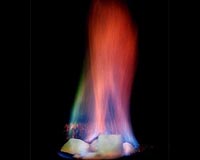 |
Washington (AFP) May 10, 2011 Methane leaks are contaminating drinking water near shale gas drilling sites in the northeastern United States, scientists said Tuesday, placing a further question mark over this fast-growing energy source. Scientists tested water samples taken from 68 private wells in five counties in Pennsylvania and New York to explore accusations that "hydro-fracking" -- a contested technique to extract shale gas -- has contaminated groundwater. Methane was found in 85 percent of the samples, and at sites within a kilometer (0.6 mile) of active hydraulic-fracturing operations, levels were 17 times higher than in wells far from such operations, said the study by researchers at Duke University in North Carolina. "In these rural areas, almost everybody has a well," lead author Stephen Osborn told AFP. "They are using it for drinking, for their livestock, for agriculture." While some residents have sounded the alarm about running faucets that ignite if a flame is placed nearby, little is actually known about the health impacts of drinking methane in the water, he said. "There is really no literature that addresses that particular issue -- the physiological response -- is methane really non-reactive in the body? What are the effects of consuming high concentrations of methane?" The paper found no evidence of contamination from the chemicals used to fracture the rock or from "produced" water -- the wastewater that emerges from the wells after the shale has been fractured. Shale gas is found in dense sedimentary rock which is fractured by large volumes of water, sand and chemicals that are piped in horizontally at very high pressure. After the fracturing, large amounts of water return to the surface within a few days, along with significant amounts of methane, which comprises the bulk of the shale gas. North America and Europe have witnessed a natural gas boom since about 2007, buoyed by high prices and fears over the political risks of imported fossil fuels. Opponents say the technique is environmentally destructive because the methane can contaminate groundwater and, if leaked to the air, add to the greenhouse effect. "Definitely natural gas is cleaner than coal but if you do it without regulation or without careful monitoring, you might harm the environment," said co-author Avner Vengosh, also of Duke University. "There is no really comprehensive oversight of what is going on. There is not enough scientific research," he added. "We are just revealing something that should have been revealed long ago before the boom took place. In some places it might be too late." The study, published on Monday in the peer-reviewed journal Proceedings of the National Academy of Sciences (PNAS), said the methane sampled near the fracking sites had an isotopic fingerprint that pointed to its source. Water from wells farther from the gas sites had lower levels of methane and a different isotopic signature. As a gas, methane is flammable and can cause explosions. It can also suffocate people. In April, scientists from New York's Cornell University found that current extraction techniques meant that shale gas carried a greater carbon footprint than oil, coal and conventional gas over at least a 20-year period. According to the US Department of Energy, total domestic production of natural gas will grow by 20 percent by 2035. Shale gas alone will increase its share of production from 16 percent in 2009 to 45 percent in 2035. Gas industry group Energy In Depth issued a statement that hailed the study's findings that no fracking chemicals were found in well water, and heaped criticism on the parts about methane in the water. "Small data set, no random sampling, and no baseline information whatsoever," it said. "Authors intentionally downplay the fact that thermogenic methane was found in nearly every well they sampled -- even in wells in areas with no natural gas development to be found." Study co-author Rob Jackson said the reaction from the gas industry was "not surprising." "This is an issue that divides people and divides families," he said. "We have zero financial stake in this. I would love to work with gas companies but we will not and have not taken any money -- not only from gas companies but from any environmentalist group that wants to shut down hydraulic fracturing," he said. In a separate white paper, the researchers urged an independent medical review of the effects of ingesting methane and stricter regulation of hydraulic fracturing.
Share This Article With Planet Earth
Related Links Powering The World in the 21st Century at Energy-Daily.com
 Methane levels 17 times higher in water wells near hydrofracking sites
Methane levels 17 times higher in water wells near hydrofracking sitesDurham, NC (SPX) May 10, 2011 A study by Duke University researchers has found high levels of leaked methane in well water collected near shale-gas drilling and hydrofracking sites. The scientists collected and analyzed water samples from 68 private groundwater wells across five counties in northeastern Pennsylvania and New York. "At least some of the homeowners who claim that their wells were contaminated by shale-gas ... read more |
|
| The content herein, unless otherwise known to be public domain, are Copyright 1995-2010 - SpaceDaily. AFP and UPI Wire Stories are copyright Agence France-Presse and United Press International. ESA Portal Reports are copyright European Space Agency. All NASA sourced material is public domain. Additional copyrights may apply in whole or part to other bona fide parties. Advertising does not imply endorsement,agreement or approval of any opinions, statements or information provided by SpaceDaily on any Web page published or hosted by SpaceDaily. Privacy Statement |